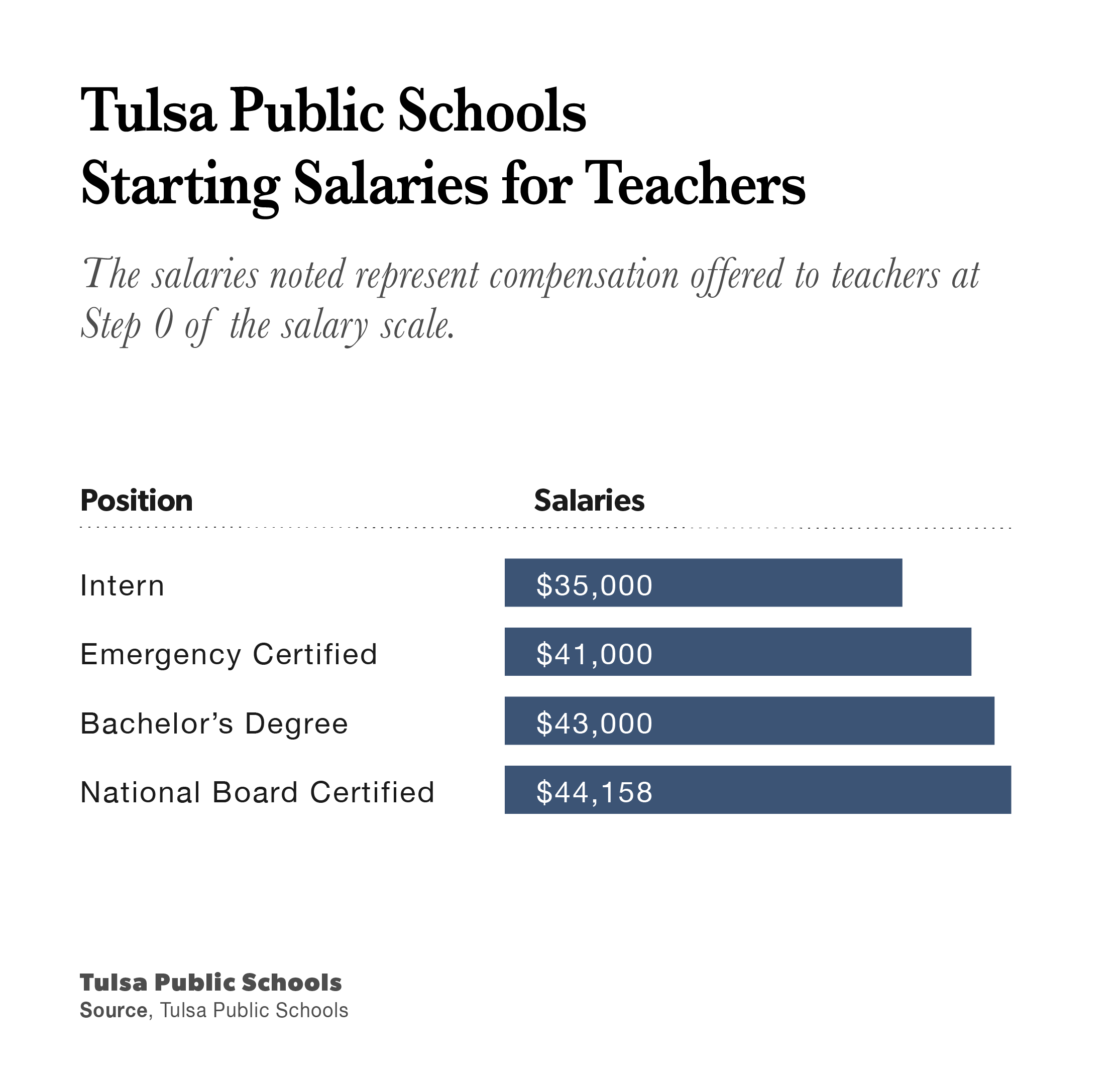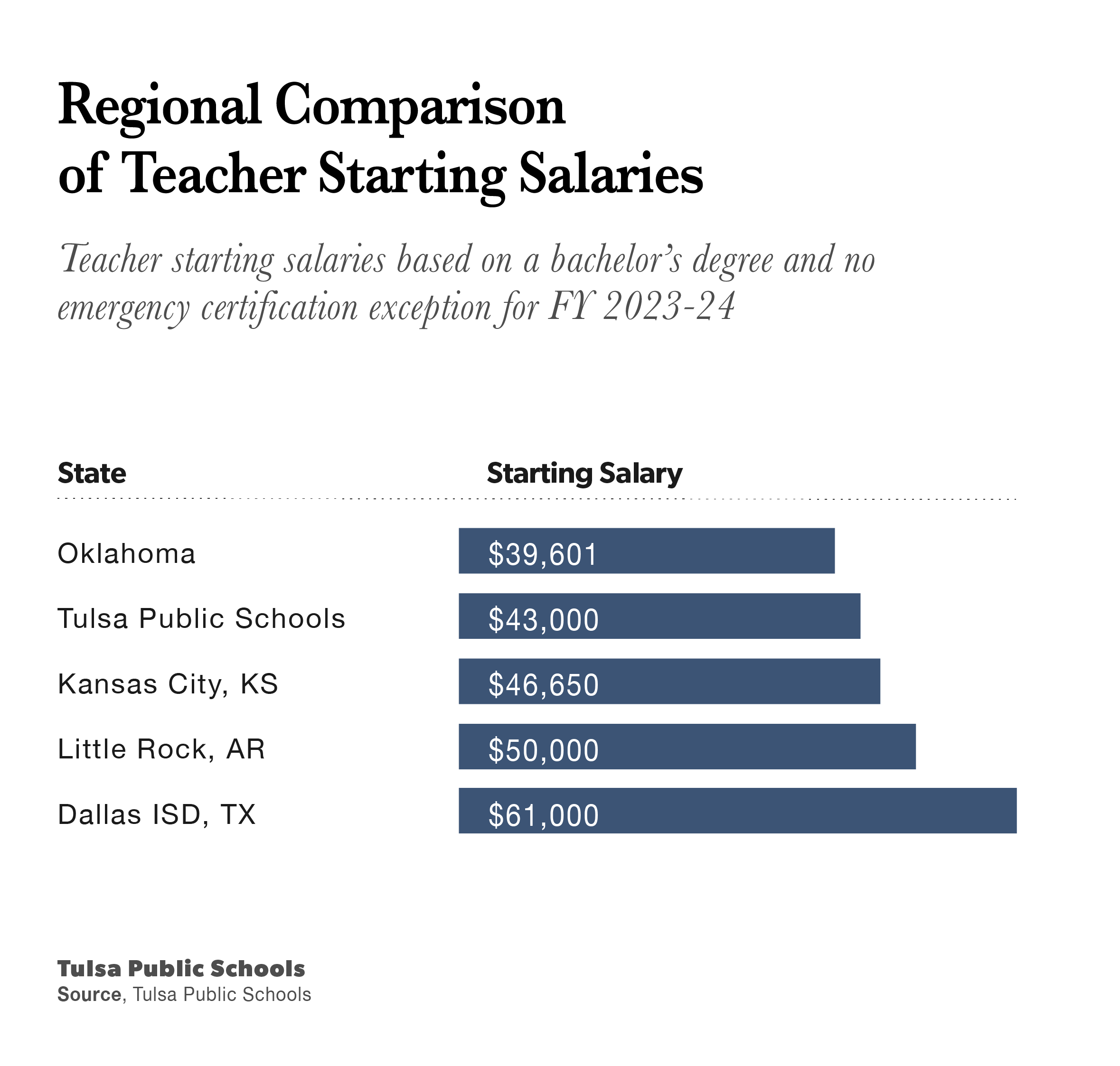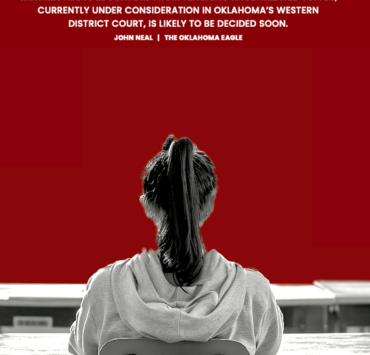
LOCAL & STATE
Oklahoma Teacher Shortage Continues
John Neal
Illustration. The Oklahoma Eagle
State Superintendent of Public Instruction Ryan Walters is doubling down on a decision to deny Oklahoma teachers’ pay raises.
Walters presented the Oklahoma State Department of Education (OSDE) proposed budget for 2024-25 to the powerful House Appropriation and Budget Education subcommittee on Jan. 10 at the Oklahoma State Capitol building. The budget included no pay raises for teachers.
After Walters explained his budget strategy to the panel, he faced numerous questions, including some tough questions from Tulsa’s two representatives on the panel.
The scenario recalled Walters first meeting of the Oklahoma State Board of Education (OSBE) in January 2023. In that session that was held soon after he took over as state superintendent, he led board members to remove a teacher pay increase from the department’s proposed budget. Oklahoma ranked near the bottom among states in teacher pay and faced a critical teacher shortage. Those circumstances have changed little in the past year.
The proposed OSDE budget will be decided in the new legislative session. Several lawmakers have already introduced separate bills to increase teacher pay and change Walter’s budget proposal.
In the session last month, the House subcommittee members asked about teacher shortages and the record number of emergency certifications issued for persons not otherwise qualified to teach. Walters responded, “We are not there yet.” But he continued to defend a proposed budget that cuts $47 million in education spending over the previous year.
St. Rep. Meloyde Blancett (D-78) asked Walters why he had targeted Tulsa Public Schools (TPS) for harsh criticism. Rep. John Waldron (D-77) peppered Walters with questions about his factual assertions during the budget hearing. Waldron repeatedly requested more information from the Superintendent concerning proposed department activities and spending.
Proposed decrease in education spending
Despite Superintendent Walters and the OSBE recommendation for no teacher across-the-board pay increase in January 2023, the state bumped teacher annual salaries from $3,000 to $6,000 based on job experience. The Oklahoma Eagle staff performed an analysis of Oklahoma teacher pay based on various published teacher salary surveys. The 2023 increase brings Oklahoma into a more competitive position in the state’s region but leaves teacher salaries at least $10,000 below the national average teacher pay.
The following chart shows teacher related positions starting salaries based on entry level qualifications.

While the OSDE budget for FY 2024-25 recommended by Walters to the Oklahoma legislature proposes no increase in teacher salaries, it includes the opportunity for additional pay based on extra work or performance incentives.
The following is a regional comparison of teacher starting salaries based on a bachelor’s degree and no emergency certification exception for FY 2023-24:

The OSBE budget recommendation includes no material changes to the State Aid Formula, which channels state funds to school districts. Thus, school districts will have no additional discretionary spending from the state to hire additional teachers or pay them more.
State direct aid to schools represents over 75 % of the board approved OSDE budget for 2024-25. Walters told the subcommittee that “allocation” of the Literacy Pilot and School Resource Officer programs are being spread over several years. The State Superintendent said this spreading of funds gave the department the “budget cuts” necessary to net the department a reduction of $47 million over the previous year.
At the same September 2023 meeting approving the proposed budget, the OSBE approved another round of “emergency” teacher certifications, now being issued in record numbers. The OSBE issues these certifications to teachers who lack the training and qualifications to teach their assigned subject and grade level.
By the end of December 2023, the board has approved the issuance of 4,776 such emergency certifications to fill in for teacher shortages. This number is up from less than 200 statewide a decade ago. It is a historic high and represents more than 10% of all public school teacher positions. Tulsa Public Schools had approximately 300 issued during the current period.
“Back to Basics”
State Superintendent Walters is leading the education department in a decidedly different direction, particularly regarding funding activities to address student test scores. His approach includes adopting new rules tying academic achievement to accreditation. The budget also sets aside funds under the direct control of the OSDE to assist select school districts or targeted groups within a district.
Walters dubbed the program “Back to Basics” in presentations to the OSBE and subsequently to the House education subcommittee. He has carved out $66.55 million in the OSDE budget for the program. The program’s major components are student tutoring, teacher training, performance incentives, and signing bonuses for teacher recruitment.
The FY 2024-25 effort involves continuing and expanding some initiatives that began in the current year, which used Tulsa Public Schools as a test case and example. Various observers, including some State Board members, cautioned against unreasonable expectations from the programs for Tulsa Public Schools. Walters and the OSBE regularly faced criticism from the public at their monthly meetings, who often alleged the board was targeting TPS and being too harsh.
Some of this criticism was also made by local and state elected officials. However, new TPS Superintendent Ebony Johnson has repeatedly thanked Walters for OSDE help. Johnson said her gratitude extended beyond technical assistance from education department professional staff to include strong financial support for TPS tutoring programs.
Questions linger
Superintendent Walters set the tone for the meeting with House legislators by emphasizing the uphill battle Oklahoma schools face. In particular, Walters cited national student test scores that place Oklahoma near the bottom among the 50 states.
The superintendent also briefed legislators on a recently released Stanford University study that named Oklahoma as the greatest loser from COVID-19 related student learning losses. According to Eric Hanusher’s study, The Economic Cost of the Pandemic, Oklahoma is projected to experience the highest per person economic loss in the nation. The total economic loss is expected to be “$200 billion for the state in the 21st century,” Walters told the House subcommittee.
In response, Rep. Chad Caldwell (R-40) expressed skepticism that the proposed $15 million tutoring program could overcome these forecasted learning losses.
Caldwell asked Walters, “Is this your answer to reverse those trends?” Walters replied, “Yes sir!”
Waldron, one of the state representatives whose district includes a segment of north Tulsa, also questioned the math behind the cost-benefit calculation of the tutoring program. The Back to Basics program of slightly over $60 million is less than two percent of the total budget scheduled for the department in 2024-25.
Signing Bonuses
Most of the criticism of the OSDE budget centered around the signing bonus program aimed at teacher recruitment. The program pays teachers between $15,000 to $50,000 to return or come to Oklahoma to teach in rural or high poverty districts in 2023-24.
Walters’ budget will spend $10 million for the program next year after adding 522 teachers this year. But the program successfully recruited only 67 teachers from out of state. Those meager results drew some backlash from critics of the program.
Subcommittee Chair Rep. Mark McBride (R-53) also questioned the policy provision that paid the teachers all the bonus money up front. The state needs to “claw back” the money if the five-year teaching commitment is unkept. McBride told Walters he would introduce legislation spreading the bonus payout over several years.
Since the legislative meeting, multiple media outlets have reported there are serious flaws in the program’s administration. At least nine teachers are being asked to return the money immediately. Walters has claimed applications were falsified while several legislators lay the blame on the state agency.









